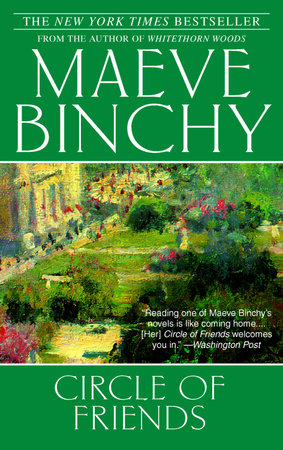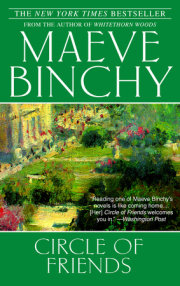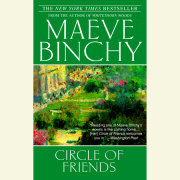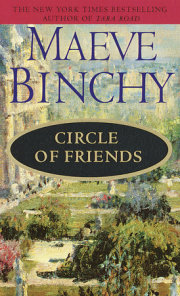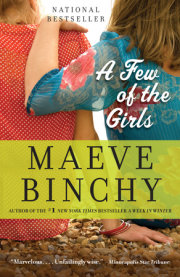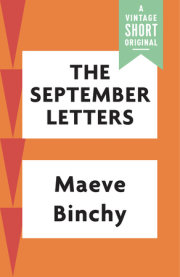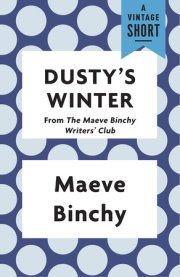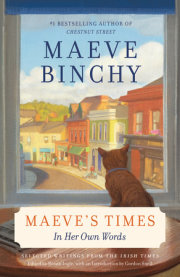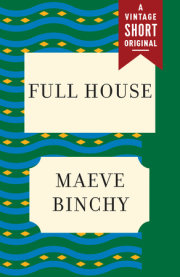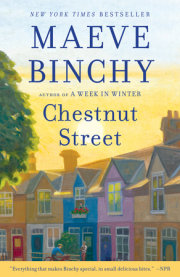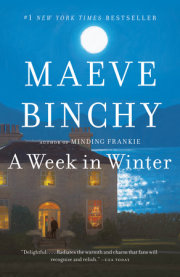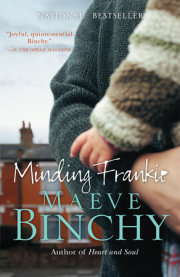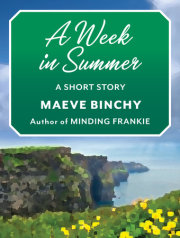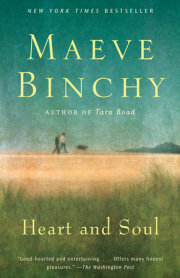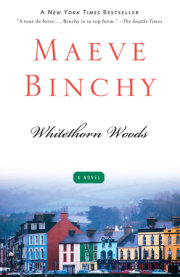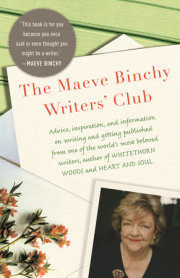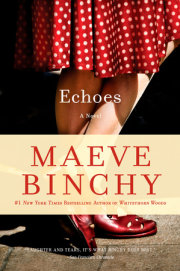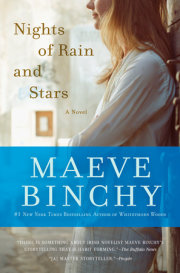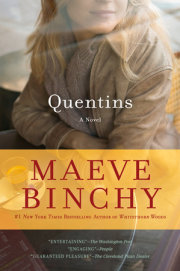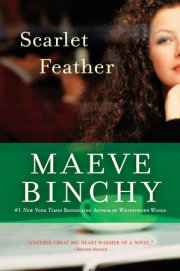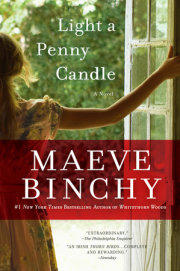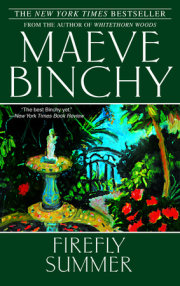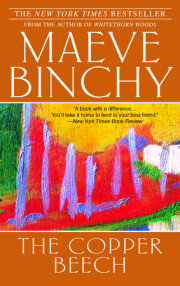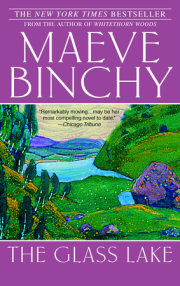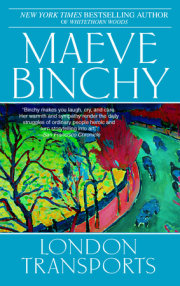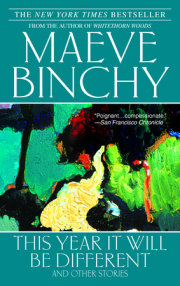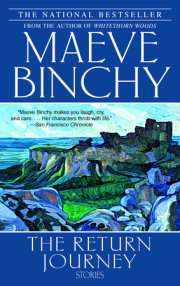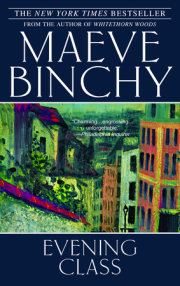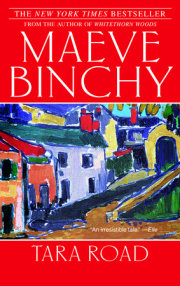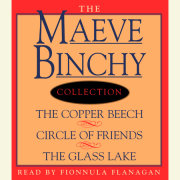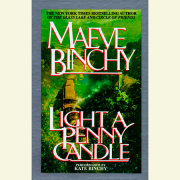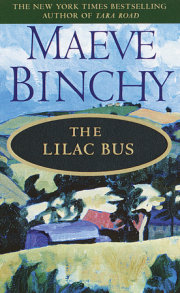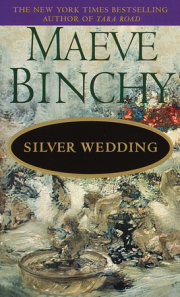The kitchen was full of the smells of baking. Benny put down her school bag and went on a tour of inspection.
"The cake hasn't been iced yet," Patsy explained. "The mistress will do that herself."
"What are you going to put on it?" Benny was eager.
"I suppose Happy Birthday Benny." Patsy was surprised.
"Maybe she'll put Benny Hogan, Ten."
"I never saw that on a cake."
"I think it is, when it's a big birthday like being ten."
"Maybe." Patsy was doubtful.
"And are the jellies made?"
"They're in the pantry. Don't go in poking at them, you'll leave the mark of your finger and we'll all be killed."
"I can't believe I'm going to be ten," Benny said, delighted with herself.
"Ah, it's a big day all right." Patsy spoke absently as she greased the trays for the queen cakes with a scrap of butter paper.
"What did you do when you were ten?"
"Don't you know with me every day was the same," Patsy said cheerfully. "There was no day different in the orphanage until I came out of it and came here."
Benny loved to hear stories of the orphanage. She thought it was better than anything they read in books. There was the room with the twelve iron beds in it, the nice girls, the terrible girls, the time they all got nits in their hair and had their heads shaved.
"They must have had birthdays," Benny insisted.
"I don't remember them." Patsy sighed. "There was a nice nun who said to me that I was Wednesday's child, full of woe."
"That wasn't nice."
"Well, at least she knew I was born on a Wednesday . . . Here's your mother, now let me get on with the work."
Annabel Hogan came in carrying three big bags. She was surprised to see her daughter sitting swinging her legs in the kitchen.
"Aren't you home nice and early? Let me put these things upstairs."
Benny ran over to Patsy when her mother's heavy tread was heard on the stairs.
"Do you think she got it?"
"Don't ask me Benny, I know nothing."
"You're saying that because you
do know."
"I
don't. Really."
"Was she in Dublin? Did she go up on the bus?"
"No, not at all."
"But she must have." Benny seemed very disappointed.
"No, she's not long gone at all. . . . She was only up the town."
Benny licked the spoon thoughtfully. "It's nicer raw," she said.
"You always thought that." Patsy looked at her fondly.
"When I'm eighteen and can do what I like, I'll eat all my cakes uncooked," Benny pronounced.
"No you won't, when you're eighteen you'll be so busy getting thin you won't eat cakes at all."
"I'll always want cakes."
"You say that now. Wait till you want some fellow to fancy you."
"Do you want a fellow to fancy you?"
"Of course I do, what else is there?"
"What fellow? I don't want you to go anyway."
"I won't get a fellow, I'm from nowhere, a decent fellow wouldn't be able to talk about me and where I came from. I have no background, no life before, you see."
"But you had a
great life," Benny cried. "You'd make them all interested in you."
There was no time to discuss it further. Benny's mother was back in the kitchen, her coat off and down to business with the icing sugar.
"Were you in Dublin at all today, Mother?"
"No child, I had enough to do getting things ready for the party."
"It's just I was wondering . . ."
"Parties don't run themselves you know." The words sounded sharp but the tone was kindly. Benny knew her mother was looking forward to it all too.
"And will Father be home for the cake bit?"
"Yes, he will. We've asked the people for half-past three, they'll all be here by four, so we needn't sit down to the tea until half-past five, and we wouldn't have got to the cake until your father has the business closed, and is back here."
Benny's father ran Hogan's Outfitters, the big menswear shop in the middle of Knockglen. The shop was often at its busiest on a Saturday, when the farmers came in, or the men who had a half day themselves were marched in by wives to have themselves fitted out by Mr. Hogan, or Mike the old assistant, the tailor who had been there since time immemorial. Since the days when young Mr. Hogan had bought the business.
Benny was glad that her father would be there for the cake, because that was when she might be given her present. Father had said it was going to be a wonderful surprise. Benny
knew that they must have got her the velvet dress with the lacy collar and the pumps to go with it. She had wanted it since last Christmas when they went to the pantomime in Dublin and she had seen the girls on the stage dancing in pink velvet dresses like this.
They had heard that they sold them in Clerys, and that was only a few minutes from where the bus stopped when it went to Dublin.
Benny was large and square, but she wouldn't look like that in the pink velvet dress. She would be just like the fairy dancers they had seen on the stage, and her feet wouldn't look big and flat in those shoes because they had lovely pointy toes, and little pom-poms on them.
The invitations to the party had been sent out ten days ago. There would be seven girls from school, farmers' daughters mainly from outside Knockglen. And Maire Carroll, whose mother and father owned the grocery. The Kennedys from the chemist's were all boys so they wouldn't be there, and Dr. Johnson's children were all too young so they couldn't come either. Peggy Pine who ran the smart clothes shop said that she might have her young niece staying with her. Benny said she didn't want anyone they didn't know, and it was with some relief that they heard the niece Clodagh didn't want to go amongst strangers either.
Her mother had insisted she invite Eve Malone and that was bad enough. Eve was the girl who lived in the convent and knew all the nuns' secrets. Some people at school said look how Mother Francis never gives out to Eve, she's the real pet; others said the nuns had to keep her for charity and didn't like her as much as they liked the other girls whose families all contributed something to the upkeep of St. Mary's.
Eve was small and dark. She looked like a pixie sometimes, her eyes darting here and there, forever watchful. Benny neither liked Eve nor disliked her. She envied her being so fleet and lithe and able to climb walls. She knew that Eve had her own room in the convent, behind the curtain where no other girl was allowed to step. The girls said it was the room with the round window that faced down the town and that Eve could sit at the window and watch everyone and where they went and who they were with. She never went on holidays anywhere, she stayed with the nuns all the time. Sometimes Mother Francis and Mrs. Pine from the dress shop would take her on an outing to Dublin, but she had never stayed away a night.
Once, when they had gone on a nature walk, Eve had pointed to a small cottage and said that it was her house. It stood in a group of small houses, each separate and surrounded by a little stone wall. When she was older she would live in it all on her own and there would be no milk allowed in the door, and no clothes hangers. She would put all her things on the floor because it was hers to do what she liked with.
Some of them were half afraid of Eve, so nobody denied the story, but nobody really believed it either. Eve was so strange, she could make up tales and then, when everyone had got interested, she would say, "Fooled you."
Benny didn't really want her to come to the party, but for once Mother had been insistent.
"That child has no home. She must come to this one when there's a celebration."
"She
has a home, Mother, she's got the run of the whole convent."
"That's not the same. She's to come here, Benny, that's my last word."
Eve had written a very neat correct letter saying that she accepted the invitation with pleasure.
"They taught her to write nicely," Eve's father had said approvingly.
"They're determined to make a lady out of her," Mother had said. No one would explain why it seemed so important.
"When it's her birthday she only gets holy pictures and holy water fonts," Benny reported. "That's all the nuns have, you see."
"God, that would turn a few of them over in their graves up there under the yew trees," Benny's father had said, but again there was no explanation of why.
"Poor Eve, what a start for her," Benny's mother sighed.
"I wonder was she born on a Wednesday like Patsy." Benny was struck by something.
"Why would that matter?"
"She'd be miserable. Wednesday's child is full of woe," Benny parroted.
"Nonsense." Her father was dismissive.
"What day was I born on?"
"A Monday, Monday September eighteenth, 1939," her mother said. "At six o'clock in the evening."
Her parents exchanged glances, looks that seemed to remember a long wait for a first and, as it turned out, an only child.
Copyright © 2007 by Maeve Binchy. All rights reserved. No part of this excerpt may be reproduced or reprinted without permission in writing from the publisher.

